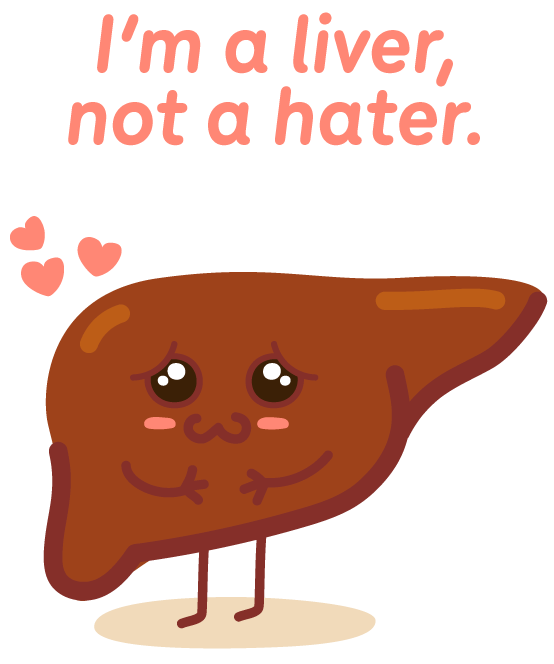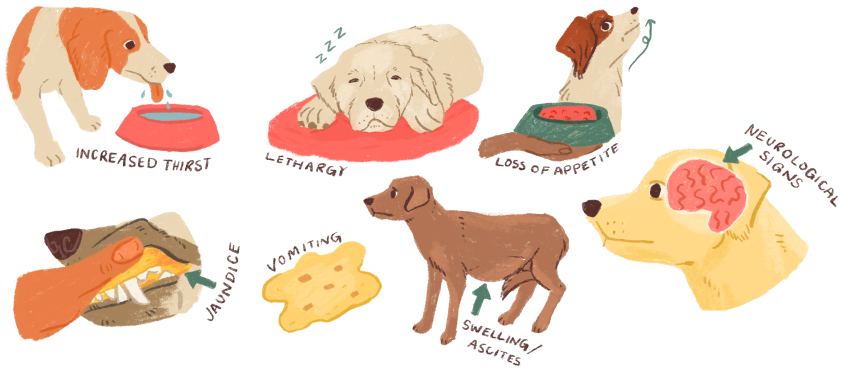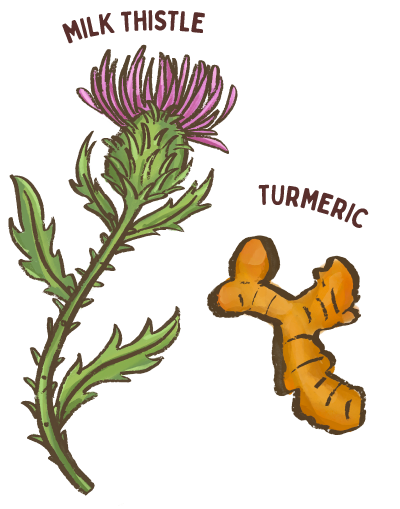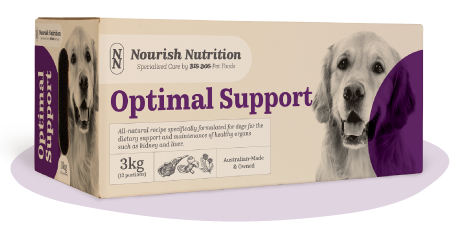Understanding Liver Disease in Pets: How Diet Can Make a Difference

As a veterinarian, I cannot emphasise enough the liver's vital role in your pet’s overall health. This essential organ is responsible for detoxifying the body, metabolising nutrients, and supporting digestion. Beyond filtering toxins, the liver plays a crucial part in immune system regulation and hormone balance. Its relationship with the gut is particularly significant; poor gut health—whether due to dietary imbalances or other factors—can overburden the liver, forcing it to work harder to detoxify the body.
The liver serves as the body’s natural filter. When it becomes overwhelmed, it struggles to perform its functions efficiently. This is where the gut-liver axis comes into play. An inflamed or leaky gut, often resulting from a poor diet or stress, allows harmful bacteria, poorly digested nutrients and toxins to enter the bloodstream, further stressing the liver. This gut-liver connection highlights the importance of maintaining good gut health for the liver's well-being.
The Liver's Detoxification Process

The liver detoxifies through a two-phase process. In Phase I, the liver breaks down toxins into less harmful substances via a series of chemical reactions. Phase II further processes these substances to prepare them for excretion, typically through urine or bile (Washabau, 2012). However, environmental and dietary stressors can overwhelm the liver's ability to complete this detoxification. Pollutants from household products (careful what you clean the house with!) and toxins found in processed foods can complicate the liver's task. A stressed liver cannot effectively detoxify the body, leading to toxin accumulation and potential liver damage.
Clinical Signs of Liver Disease in Pets
Liver disease can manifest in various ways, some subtle and others more obvious. Early signs may include increased thirst (polydipsia), lethargy, or a decreased appetite—symptoms easily overlooked or attributed to less serious conditions. As the disease progresses, more definitive signs may appear, such as jaundice (yellowing of the skin, gums, or eyes), vomiting, and abdominal swelling due to fluid accumulation (ascites). Neurological symptoms like disorientation, circling, or seizures can also occur, indicating hepatic encephalopathy—a condition arising from the liver's inability to filter toxins.

Given the diverse symptoms, it’s crucial for pet owners to recognise both subtle and serious signs of liver disease and to seek veterinary care promptly.
Diagnosing Liver Disease in Pets
Diagnosing liver disease requires a combination of clinical evaluation, blood tests, and imaging techniques. Standard blood tests, such as a complete blood count (CBC) and biochemical profile, can reveal elevated liver enzymes, often the first indication of liver damage (Comazzi et al., 2004). Functional blood tests—like bile acids or ammonia tests—provide a more comprehensive view of the liver’s ability to detoxify and produce bile. Imaging techniques, such as ultrasound, allow veterinarians to visualise the liver's structure and identify abnormalities like enlargement, scarring, or tumours. In complex cases, CT scans may be recommended for a detailed assessment, and a liver biopsy may be required to obtain a definitive diagnosis.
Treatment of Liver Disease in Pets
The treatment of liver disease depends on the underlying cause and severity of the condition. Supportive care—such as intravenous fluids and medications for symptoms like nausea or seizures—may be sufficient in some cases. Antibiotics or anti-inflammatory medications may be prescribed if infection or inflammation is present. However, dietary management is often a cornerstone of treatment. Low-protein diets can help reduce the liver's workload, and specialised liver diets like those from Big Dog Foods, provide the nutrients necessary to support liver function. In more severe cases, surgery may be required to remove tumors or correct anatomical issues contributing to liver dysfunction.
Proactively Supporting Your Pet’s Liver

Prevention is always better than cure when it comes to liver disease. The liver is resilient, but proactively supporting it with a healthy diet rich in antioxidants can lessen the burden of detoxification and protect it from oxidative stress. Antioxidants such as vitamins E and C, along with compounds like milk thistle, medicinal mushrooms and turmeric, can help neutralise harmful free radicals that contribute to liver damage.
Milk thistle, for instance, contains silymarin, a compound known for its liver-protective properties. Studies show that silymarin has antioxidant, anti-inflammatory, and antifibrotic effects, making it a popular choice for liver support (Giannetto et al., 2022). Turmeric, another powerful antioxidant contains curcumin, which protects against liver damage by inhibiting oxidative stress and inflammatory pathways.
Diet plays a fundamental role in liver health. Providing a balanced, high-quality diet free from unnecessary additives, chemicals, and low-quality ingredients can reduce dietary stress on the liver. Probiotics and prebiotics are beneficial for gut health, which in turn supports the liver by preventing harmful toxins from overloading it.

Check out Nourish Nutrition Optimal Support diet.
Conclusion
Liver disease is a serious condition, but with early detection, proper treatment, and proactive care, it can be effectively managed. Incorporating foods or supplements specifically formulated for liver support, can give your pet targeted nutrients that promote liver health and enhance the detoxification process. Regular blood tests can help monitor your pet’s liver health and catch early signs of trouble before they escalate into more serious conditions. Ultimately, understanding that diet plays a crucial role in both treatment and prevention will enable you to provide your pet with the support they need for a healthy, happy life.
About the Author - Dr. Nicole Rous

Dr. Nicole Rous completed her degree with Honours from the University of Sydney in 2008. She initially worked in the UK before returning to small animal practice in Melbourne, Australia. Dr. Nicole has a keen interest in animal reproduction and has been granted Membership with the Australian and New Zealand College of Veterinary Scientists in this specialty. She is also passionate about complementary therapies such as massage and enjoys discussing ways to enhance pets' overall well-being and quality of life.
In August 2021, Dr. Nicole joined the Mont Albert Veterinary Surgery team as a director and continues to provide exceptional care to her patients. She is dedicated to utilising her knowledge and experience to assist pets in living longer, healthier, and happier lives.
Dr. Nicole's commitment to providing natural and holistic health practices for pets inspired her to establish Shy Tiger, a company that offers natural pet products made from premium ingredients sourced primarily from Australian farms and producers. Her expertise in natural health practices and dedication to providing excellent care to her patients make her a reliable partner for pet owners in Melbourne and beyond.
If you liked this article, sign up to our Big Dog Fam Mail to receive more great pet health and happiness advice.
REFERENCES
Comazzi, S., Pieralisi, C., & Bertazzolo, W. (2004). Haematological and Biochemical Abnormalities in Canine Blood: Frequency and Associations in 1022 samples. Journal of Small Animal Practice, 45(7), 343-349.
Giannetto, C., Arfuso, F., Giudice, E., Rizzo, M., Piccione, G., Mhalhel, K., & Levanti, M. (2022). Antioxidant and Hepatoprotective Effect of a Nutritional Supplement with Silymarin Phytosome, Choline Chloride, L-Cystine, Artichoke, and Vitamin E in Dogs. Antioxidants, 11(12), 2339.
Washabau, R.J. (2012). Liver. In Gastrointestinal and Liver Diseases of the Dog and Cat (Ch. 61, pp. 849-947).
